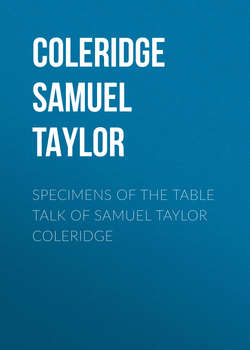Читать книгу Specimens of the Table Talk of Samuel Taylor Coleridge - Coleridge Samuel Taylor - Страница 63
TABLE TALK
June 1. 1830
ОглавлениеPRAYER.—CHURCH-SINGING.—HOOKER.—DREAMS
There are three sorts of prayer:—1. Public; 2. Domestic; 3. Solitary. Each has its peculiar uses and character. I think the church ought to publish and authorise a directory of forms for the latter two. Yet I fear the execution would be inadequate. There is a great decay of devotional unction in the numerous books of prayers put out now-a-days. I really think the hawker was very happy, who blundered New Form of Prayer into New former Prayers.63
I exceedingly regret that our church pays so little attention to the subject of congregational singing. See how it is! In that particular part of the public worship in which, more than in all the rest, the common people might, and ought to, join,—which, by its association with music, is meant to give a fitting vent and expression to the emotions,—in that part we all sing as Jews; or, at best, as mere men, in the abstract, without a Saviour. You know my veneration for the Book of Psalms, or most of it; but with some half dozen exceptions, the Psalms are surely not adequate vehicles of Christian thanksgiving and joy! Upon this deficiency in our service, Wesley and Whitfield seized; and you know it is the hearty congregational singing of Christian hymns which keeps the humbler Methodists together. Luther did as much for the Reformation by his hymns as by his translation of the Bible. In Germany, the hymns are known by heart by every peasant: they advise, they argue from the hymns, and every soul in the church praises God, like a Christian, with words which are natural and yet sacred to his mind. No doubt this defect in our service proceeded from the dread which the English Reformers had of being charged with introducing any thing into the worship of God but the text of Scripture.
* * * * *
Hooker said,—That by looking for that in the Bible which it is impossible that any book can have, we lose the benefits which we might reap from its being the best of all books.
* * * * *
You will observe, that even in dreams nothing is fancied without an antecedent quasi cause. It could not be otherwise.
63
"I will add, at the risk of appearing to dwell too long on religious topics, that on this my first introduction to Coleridge he reverted with strong compunction to a sentiment which he had expressed in earlier days upon prayer. In one of his youthful poems, speaking of God, he had said—
—'Of whose all-seeing eye
Aught to demand were impotence of mind.'
This sentiment he now so utterly condemned, that, on the contrary, he told me, as his own peculiar opinion, that the act of praying was the very highest energy of which the human heart was capable, praying, that is, with the total concentration of the faculties; and the great mass of worldly men and of learned men he pronounced absolutely incapable of prayer."—Tait's Magazine, September, 1834, p. 515.
Mr. Coleridge within two years of his death very solemnly declared to me his conviction upon the same subject. I was sitting by his bedside one afternoon, and he fell, an unusual thing for him, into a long account of many passages of his past life, lamenting some things, condemning others, but complaining withal, though very gently, of the way in which many of his most innocent acts had been cruelly misrepresented. "But I have no difficulty," said he, "in forgiveness; indeed, I know not how to say with sincerity the clause in the Lord's Prayer, which asks forgiveness as we forgive. I feel nothing answering to it in my heart. Neither do I find, or reckon, the most solemn faith in God as a real object, the most arduous act of the reason and will. O no, my dear, it is to pray, to pray as God would have us; this is what at times makes me turn cold to my soul. Believe me, to pray with all your heart and strength, with the reason and the will, to believe vividly that God will listen to your voice through Christ, and verily do the thing he pleaseth thereupon—this is the last, the greatest achievement of the Christian's warfare upon earth. Teach us to pray, O Lord!" And then he burst into a flood of tears, and begged me to pray for him. O what a sight was there!—ED.
